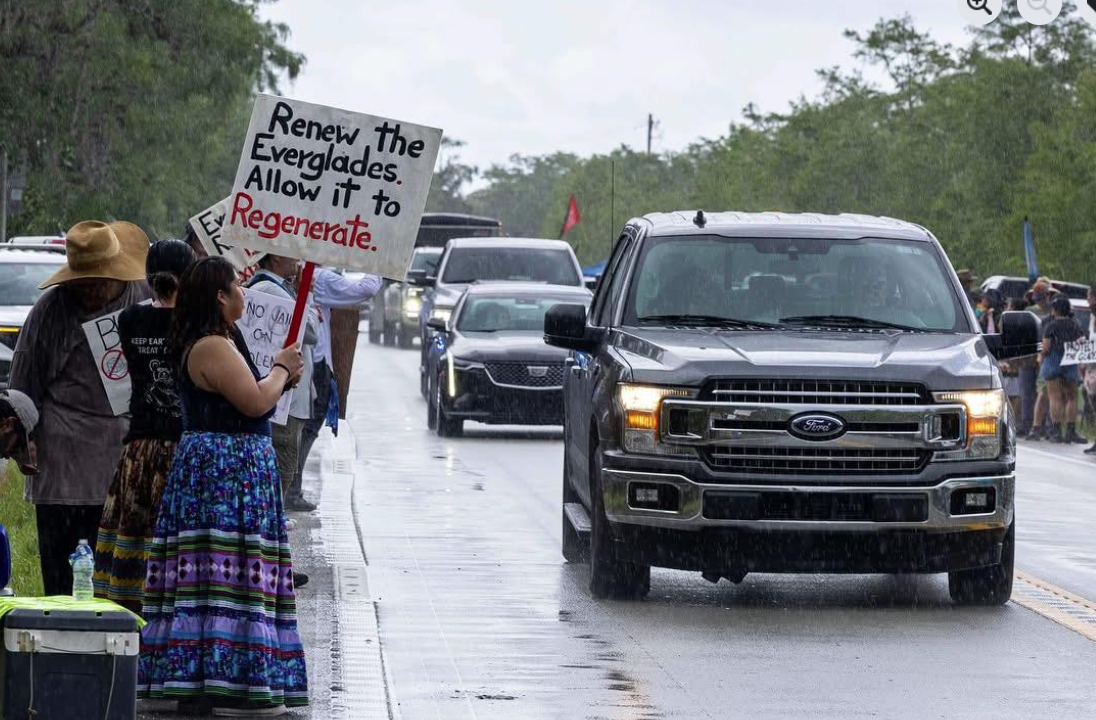
- Details
- By Levi Rickert
A federal judge in Miami ruled late Thursday that Florida is prohibited from transferring any more individuals to the Everglades detention facility known as "Alligator Alcatraz."
In an 82-page decision, U.S. District Judge Kathleen M. Williams sided with environmental advocates, ordering the state to halt all construction at the site. She also gave Florida 60 days to dismantle fencing, lighting, generators, and waste containers installed to support the project.
The Court’s ruling was in response to a lawsuit filed by the Miccosukee Tribe of Indians of Florida, together with Friends of the Everglades and the Center for Biological Diversity. Last month, the Tribe moved to intervene in the ongoing federal case, Friends of the Everglades, Inc. et al. v. Noem et al. The Court granted the Tribe’s request to intervene.
The Miccosukee Tribe of Indians of Florida released a statement late Thursday applauding Judge Williams' ruling.
The Tribe filed suit alongside the other plaintiffs to stop the unpermitted construction of Alligator Alcatraz adjacent to ten traditional Miccosukee villages, on public lands seized by emergency order.
Thursday's decision accomplishes three objectives in fulfillment of the National Environmental Policy Act:
(1) Halting further construction activities at the immigration detention facility;
(2) Prohibiting detention of additional prisoners not already detained; and
(3) Ordering the removal off all fencing, generators, sunbelt lighting, sewage, and other waste and waste receptacles within 60 days, or when the facility is rendered safe.
"This is not our first fight for our land and rights. The Miccosukee Tribe remains steadfast in our commitment to protect our ancestral lands in Big Cypress from development as a permanent detention facility. We welcome the Court's decision to halt further expansion of this facility, and we will continue to fight to ensure that the government does not dodge its legal requirements for environmental review on seized public lands, sacred to our people," Miccosukee Chairman Talbert Cypress said in the statement.
Judge Williams also ordered the government to take down temporary fencing that had limited access for Miccosukee tribal members, ensuring they can once again reach the site as they did before the facility was built.
Officials have not revealed how many people are currently being held at the remote facility located in the wetlands west of Miami.
The Justice Department did not immediately respond to a request for comment. Likewise, the offices of Florida Governor Ron DeSantis and the Florida Division of Emergency Management did not provide immediate responses.
Florida Governor Ron DeSantis opened the facility in July, stating it was intended to eventually house up to 4,000 individuals awaiting deportation as part of former President Donald Trump’s immigration enforcement efforts.
For the Miccosukee Tribe, the fight continues.
"We will always stand up for our culture, our sovereignty, and for the Everglades. When it comes to our homeland, there is no compromise," Chairman Cypress said.
More Stories Like This
50 Years of Self-Determination: How a Landmark Act Empowered Tribal Sovereignty and Transformed Federal-Tribal RelationsNCAI Resolution Condemns “Alligator Alcatraz”
NABS Documents 134 More Survivor Stories, Expands Digital Archive in 2025
Navajo Nation Considers Ending Statute of Limitations for Child Sex Offenses
Pokagon Band allowed into Michigan Adult-use Cannabis Market Through State Agreement
Help us defend tribal sovereignty.
At Native News Online, our mission is rooted in telling the stories that strengthen sovereignty and uplift Indigenous voices — not just at year’s end, but every single day.
Because of your generosity last year, we were able to keep our reporters on the ground in tribal communities, at national gatherings and in the halls of Congress — covering the issues that matter most to Indian Country: sovereignty, culture, education, health and economic opportunity.
That support sustained us through a tough year in 2025. Now, as we look to the year ahead, we need your help right now to ensure warrior journalism remains strong — reporting that defends tribal sovereignty, amplifies Native truth, and holds power accountable.
 The stakes couldn't be higher. Your support keeps Native voices heard, Native stories told and Native sovereignty defended.
The stakes couldn't be higher. Your support keeps Native voices heard, Native stories told and Native sovereignty defended.
Stand with Warrior Journalism today.
Levi Rickert (Potawatomi), Editor & Publisher


